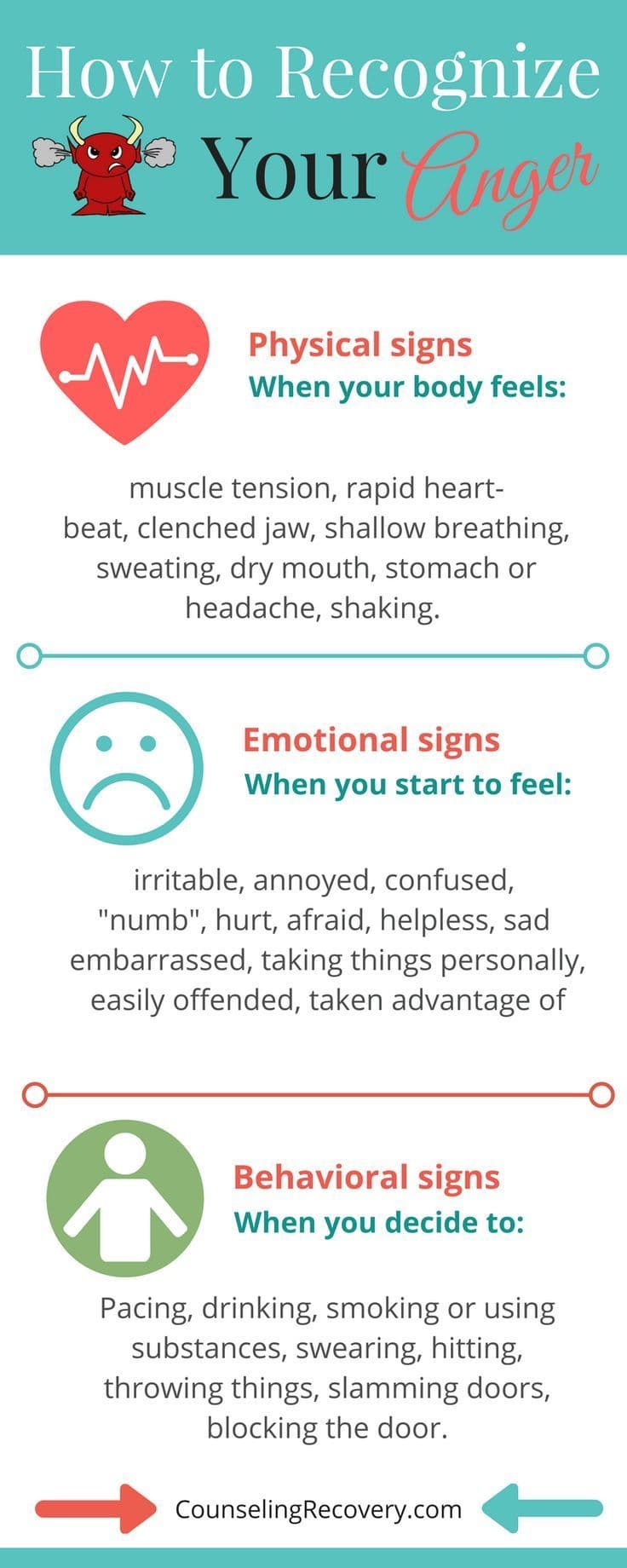
A common misconception about anger is that it is an unacceptable negative emotion that one should not express. In reality, it is a natural response when you are hurt, threatened or frustrated by difficult situations. Anger can have both constructive and destructive effects on your life, depending what you do with it. While venting your feelings of anger can help to release intense emotion that may potentially lead to physical and mental health problems, it has the potential to cause serious damage if left unchecked. Unresolved anger can lead to violent outbursts against others, which may even result in legal consequences.
What is Anger?
Everybody feels the basic human emotion of anger from time to time. It's generally viewed as an unpleasant emotion brought on by emotional or physical pain, or when faced with things or situations we can't change that are stopping us from achieving our goals. It is, however, a natural emotion that is experienced in different ways according to the makeup of an individual.
The Three Types of Anger
Anger is divided into three types by psychologists. The way each person expresses anger depends on their upbringing, self-control or emotional stability. However, did you know that there is a proper way of letting out the feelings of rage inside of you? Read on to learn about the three major types of anger.
Passive anger
Passive anger is often not as obvious as the other types of anger. According to psychologists, those who experience this type of anger tend to bottle up their feelings, which can lead to a loss of control and violent outbursts later on: They will say they don't feel angry at all, yet may appear irritable, depressed or feeling frustrated because things aren't going how they're supposed to be.
Open aggression
This type of anger is what most people think of when they imagine what an angry person looks like; it's what we see in action movies and what we assume happens behind closed doors after a couple has been fighting for a long time. It's loud and violent and involves lots of yelling and physical fighting. Sarcasm is key for those involved.
Assertive anger
This is a healthy emotion that aims to arrive at a resolution. A person who expresses this type of anger wants to be heard as well as hear what the other party has to say. Assertive anger is when what you are angry about is important to you. It allows you to express yourself clearly, firmly, calmly and non-aggressively without hurting or insulting the other person. This type of anger can help resolve problems in relationships between people where there has been conflict or disagreement.
The Signs of Anger
There are many physical symptoms that signal someone might be angry with themselves or others around them. Often, it's so easy to tell if a person is angry as they may turn red, start using vulgar language, or their body may stiffen. If you find yourself in a frustrating situation, be mindful of the following warning signs:
- Increased heart rate
- Clenched fists and jaw
- Furrowed eyebrows
- Tense muscles
- Raised voice tone
- Excessive sweating
- Tightness in stomach
- Feelings of hopelessness
- Irritable
- Aggressive behaviour
Source: infographicnow.com
It's worth noting, though, that some people have the ability to hide their anger. Instead of saying things they will never be able to take back or inflicting physical pain they will forever be remembered for, they choose to bottle up their feelings, which causes more harm than good.
Why Do People Bottle Anger Up?
People deal with their anger issues in different ways. Those who are prone to verbal anger will lash out at the person or thing that has provoked them without hesitation, whilst others bottle up their feelings of anger because they believe that yelling or hurling objects will not help. If anything, it might only make the situation worse. There are many reasons why some individuals consciously or unconsciously bottle anger up. These include:
- An inability to stand up for themselves or fight back in times of confrontation.
- The assumption that displaying emotion implies weakness. This is especially true in men.
- They are unaccepting of anger as a normal emotion and therefore try to conceal it.
- They worry what others may think of an angry outburst.
- They feel angry outbursts suggest an instability, which is detrimental when they assume themselves to be the rock for others.
- They don't immediately react with anger out of shock.
- They don't fully understand how they feel and therefore repress anger.
- They are afraid of being hurt or left and therefore conceal their angry feelings.
What Happens When You Bottle Up Anger
Psychologists have observed what is known as "maladaptive coping" in the majority of people who fail to use the appropriate anger management strategies. Maladaptive coping can lead to negative self-talk, self-harm and substance abuse as a result of repressed anger. There are many dangerous consequences of bottling up anger. Some of these include:
Exhaustion
Stress exhaustion can cause a number of physical ailments such as insomnia, obesity, muscle-related tension, headaches, indigestion, fatigue and unstable blood pressure. As a result of exhaustion, you may also feel depressed, dumb, anxious, argumentative, and may cause you to experience difficulties with memory and concentration.
A Change in Mood
Crabbiness and snappiness are also signs an individual is bottling up anger. They may bottle up their emotions and then suddenly one day 'explode', leaving loved ones and colleagues as the victims.
Those who bottle up anger also report feeling of depression, a lack of confidence and the inability to get themselves out of undesirable confrontations.
Illness
Pent up anger can make an individual really unwell. Anger can cause chronic stress, triggering your parasympathetic nervous system into a "fight or flight" response. In this heightened nervous state of arousal, your heart rate increases, your muscles tense, your blood pressure rises and your digestion slows, amongst a list of other destructive physiological side effects. All of these effects combined not only leave us tired but decrease our immune response, increasing vulnerability to sickness, disease and other chronic conditions.
A change in behaviour
Anger can contribute to poor work performance and relationship problems between friends, family and colleagues. Finding healthy ways to express your anger allows other people to more greatly understand you and improves communication and intimacy.
Some may also turn to cigarettes, drugs and alcohol to numb the pain brought about by anger instead of confronting the emotion and expressing it in a healthy, controlled fashion.
Anger Management Techniques
So, you now know the disastrous side effects of bottling up your anger. Please read on for more information on the many healthy ways you may choose to healthily express your anger, ensuring a longer, happier and more fulfilling life.
Breath
Let your head catch up with your anger, stop for a moment and breathe! Close your eyes and take five deep breaths; breathe in deeply and breathe out completely, letting all frustration go. The calm triggered by the extra oxygen and repetitive counting will give you the ability to reflect on your anger objectively, allowing you to think logically about things. Meditation can also be a big help in controlling your anger.
Write it all down
Putting a pen to paper is an excellent, healthy way to unload any sort of negative emotion. It gives you clarity time to reflect on why you are feeling angry, and it gives space for new perspectives to come in.
Scream into a pillow
Screaming can release the build up of negative energy caused by anger, allowing for a certain sense of calmness after. Just make sure to scream into your pillow in order to not frighten the neighbours.
Exercise
Scientific research has shown that physical activity can be used as a healthy, socially acceptable release for anger amongst other negative emotions. High-impact cardio exercise such as cycling, kickboxing or running can help your burn off stress-induced adrenalin, whilst more mindful exercise such as yoga can develop your awareness, allowing you to more readily identify your anger 'triggers'. Rage yoga is also a form of yoga you can also try to take out your anger in a healthy way.
Relax to some music
Listening to music or even playing an instrument is one of the relaxation techniques you can use to work through your angry feelings. Listening to a song on a similar subject has the ability to move you emotionally out of the anger and the power to heal it altogether.
Talk to someone you trust
If you don't feel comfortable talking about your reason for being angry with a loved one, it would be a good investment to speak to a trained psychologist, who can provide you with an outside view and advice.
Give your pet a hug
Interacting with animals is a great way to relieve pent-up feelings of frustration and anger. Dogs particularly often sense the emotions of their owners and other humans. Recent scientific studies have shown that touching a pet contributes to the healing process, lowering the parasympathetic nervous system response with their unconditional love.
If anger is causing problems in your personal relationships, at work, or even in your health, it is always advisable to seek professional help such as counselling services.
Originally published on Jun 11, 2010









